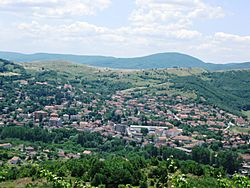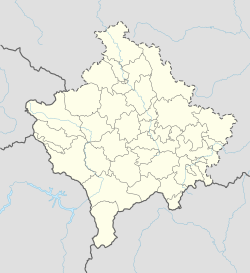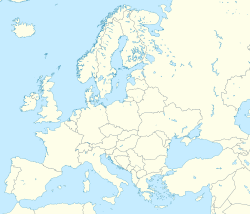Zvečan facts for kids
Quick facts for kids
Zvečan
|
|
|---|---|
|
Town and municipality
|
|

Panorama of Zvečan
|
|
| Country | Kosovo |
| District | Mitrovica |
| Settlements | 36 |
| Area | |
| • Total | 122 km2 (47 sq mi) |
| Elevation | 461 m (1,512 ft) |
| Population
(2015)
|
|
| • Total | 16,650 |
| • Density | 136.5/km2 (353.5/sq mi) |
| Time zone | UTC+1 (CET) |
| • Summer (DST) | UTC+2 (CEST) |
| Area code(s) | +383(0)28 |
| Vehicle registration | 02 |
| Climate | Cfb |
Zvečan (also spelled Zveçan) is a town and a group of villages, called a municipality, located in the Mitrovica District in Kosovo. In 2015, about 16,650 people lived there. The area covers about 122 square kilometers (47 square miles). It includes the main town and 35 smaller villages.
Zvečan is part of a region called North Kosovo. Most people living here are ethnic Serbs. There was an agreement in 2013, called the Brussels Agreement. This agreement said that Zvečan should become part of a group of Serb municipalities once they are officially set up.
Contents
A Look at Zvečan's Past
The town of Zvečan is very old and is located close to Mitrovica. It was first mentioned in history around 1091. This was during fights between the Serbs and the Byzantines. There is a special stone carving that says Stefan Nemanja, a powerful Serbian leader, won a battle against the Byzantines in 1170. After his victory, he asked for a prayer to be held at the church of St. George in Zvečan.
Zvečan as a Royal Home
In the 1200s and 1300s, Zvečan was one of the places where Serbian kings lived. Queen Theodora passed away there in December 1322. Nine years later, her husband, Stefan Uroš III, was held captive and died in Zvečan.
Later, during the time of the Serbian Empire under Uroš V (who ruled from 1355 to 1371), noble families like the Musić and Vojinović controlled the fortified city and its area. When the empire became weaker, Zvečan was a disputed area.
Under Ottoman and Austro-Hungarian Rule
In 1389, after the Battle of Kosovo, Zvečan became part of the Ottoman Empire. It was then part of a larger region called the Sanjak of Novi Pazar.
From 1878 to 1908, the Austro-Hungarian Empire managed Zvečan. This happened because of a meeting called the Congress of Berlin. But in 1908, Zvečan was given back to Turkey.
Exploring the Old Fortress
On the highest point of Zvečan, you can still see parts of the old St. George's church. There are also remains of a water storage area and the main octagonal (eight-sided) tower. The walls of this old fort were made stronger with huge towers. The main way to enter the town was from the western side.
Who Lives in Zvečan?
In 2011, the Government of Kosovo estimated that Zvečan had about 1,838 homes and 7,481 people. A report from 2015 by the OSCE stated that the whole Zvečan municipality had 16,650 residents.
Different Groups of People
Most of the people in Zvečan municipality are Kosovo Serbs. There are about 16,000 Serbs, making up about 95.1% of the population. There are also about 500 Kosovo Albanians and 300 people from other ethnic groups.
Many Serbs (about 3,750) living in the municipality are IDPs. This means they had to leave their homes in other areas but stayed within Kosovo. There are also about 250 refugees from Croatia. Most of the Kosovo Albanians live in the villages of Boletin, Lipë, and Zhazhë.
Here's a quick look at the different groups in Zvečan municipality, including those who moved there:
| Ethnic group | 2015 estimate |
|---|---|
| Serbs | 15,850 |
| Albanians | 500 |
| Bosniaks, Romani, Gorani | 300 |
| Others | - |
| Total | 16,650 |
How People Make a Living
The biggest employer in Zvečan used to be a factory called "Trepča". This factory melted lead and zinc. Its very tall smokestack, at 306 meters, is the tallest building in Kosovo.
However, the factory caused a lot of pollution. Because of this, the United Nations (UN) and KFOR (a peacekeeping force) shut it down. Now, the factory only makes alloys for batteries and recycles old batteries.
The factory used to employ up to 4,000 people. With fewer operations, it has greatly affected the local economy. Today, only about 500 people work in the municipality. They work in about 60 small private companies and 150 shops.
Culture and Learning
The Faculty of Arts is located in Zvečan. This is part of the University of Priština in Mitrovica.
Zvečan has also been home to several yearly international music festivals. These include the North City, Jazz & Blues Festival and the international rock festival Overdrive. There is also an international art colony called Sokolica and a children's song festival called Cvrkuti sa Ibra (Chirrups from the Ibar River).
The Zvečan Fortress and Sokolica Monastery are both from the Middle Ages. They are important historical sites located in the Zvečan area.
Images for kids
See also
 In Spanish: Zvečan para niños
In Spanish: Zvečan para niños
 | William Lucy |
 | Charles Hayes |
 | Cleveland Robinson |










